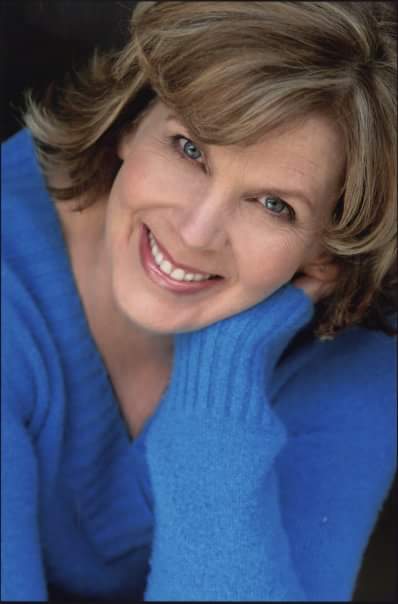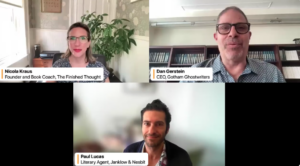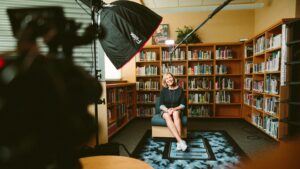
Mary Langford is a freelance writing coach, ghostwriter and editor and is currently writing her first book. For five years, Mary worked at the right hand of New York Times bestselling author and Emmy-winning producer Sidney Sheldon and later assisted world-famous hairstylist and entrepreneur Vidal Sassoon, in the writing of his autobiography. Learn more at thewritemary.com.
What’s the best piece of advice about the writing craft you’ve ever heard?
It’s something my mentor, Sidney Sheldon, told me that I believe in wholeheartedly. Writers should never take credit for their own success because all ideas are inspired by a Divine source. Our job is simply to be a willing and open vessel through which all great ideas flow.
Do you have any quick tips for working with editors?
Although not all editors will agree, I believe the editing process should be a collaborative one. Before heading into a project with an editor, make sure he or she understands your vision for your book and will hold true to that. A good editor not only sees what’s written on the page, he or she discerns what parts of what you’ve written are not a true expression of what you were trying to say. Understand that while you’ve read your manuscript over and over again, certain things you think are established in your writing may not actually be there. Trust your editor if and when they give you this kind of feedback. Remember, they are seeing your manuscript for the very first time and are your fresh pair of eyes.
Conversely, if your editor suggests or makes changes you disagree with, don’t be afraid to fight for what you believe in and say why. As an editor myself, I’m always open to hearing my clients out if they’re adamant about wanting something their way. Sometimes they win the argument, though not very often. As one of my clients likes to joke when I finally agree with her on something she’s written, “Hallelujah! That’s five for Julie and 1,075 for Mary!”
How do you stay productive and overcome blocks?
When I find myself blocked or being unproductive, the first thing I do is tidy up all my surroundings. Since I live alone and work out of my home, it’s easy for things to get messy when I’m busy writing. Dishes pile up in the sink and my dining room table quickly becomes cluttered with research, books, and several days’ worth of unopened mail. It never ceases to amaze me that when I do something as simple as cleaning up my environment, the right words almost instantly fly out of my mind onto the page.
How do you balance your own projects with your ghostwriting projects?
To date, I have done a lot more ghostwriting than my own. While I haven’t minded that much at all, 2020 will be the year that my first book, under my name, is finally released. I’m writing it with Linda Mallory, my best friend of 44 years (and counting), called Everybody Needs a Linda: 101 Tips for Friendships that Last a Lifetime. Plans for two other books I’ll be co-authoring are also in the works.
What makes a successful ghostwriter?
Successful ghostwriters have an inherent ability to hear their client’s voice and express it in ways that are better and more effective than how the client could have said it themselves. Particularly in memoir, which is my favorite genre, If you listen to the way they language (as I like to call it), you will pick up certain rhythms, patterns of speech, and verbiage that make each person unique. The best ghostwriters maintain the integrity of their clients’ stories without having to put their own spin on them. I believe the most successful ghostwriters, first and foremost, allow their clients to shine.
What’s a recent ghostwriting experience and what did you learn?
Loss, Survive, Thrive: Bereaved Parents Share Their Stories of Healing and Hope (Rowman & Littlefield, Nov 2019) is a compilation book of first-person accounts by parents who have lost a child, lived through the grieving process, and eventually went on to thrive. Of the book’s 27 contributors, only seven were published authors. Of the remaining 20, some had written articles or blogs but in ways not all that compatible with book writing. Many of those parents’ stories were ghostwritten by me. Those that weren’t involved a tremendous amount of developmental editing along the way.
It’s been told to me by more than one person that upon reading this book, they’d never have guessed that all these beautiful stories were edited and developed by the same person. To me, this is the highest compliment I could ever be paid. What I’ve learned from these experiences is that my very first job as a ghostwriter is to gain the trust of the person whose story is being told. For this particular project, I had to gently guide each parent down into their grief with a deep dive – and guide them up out of their pain into the joyous and fulfilling lives they now lead. The main purpose of Loss, Survive, Thrive is to show parents that the death of their child does not have to mean the end of their lives, too.
We read you worked with Sidney Sheldon and Vidal Sassoon—any interesting stories from them or other clients that you’ve ghostwritten for?
To be fair to both Sidney and Vidal, I didn’t actually ghostwrite their stories. That said, both required me to give them editorial feedback every step of the way. I worked with Sidney on his 18th and final novel, Are You Afraid of the Dark?, as well as his memoir, The Other Side of Me. Since Sidney had 60 years experience as a professional writer by the time he hired me, he was more than capable of writing his own stories. However, because he was 82 when we began our journey together, he relied quite heavily on my input and frequently used my suggestions.
Vidal’s first book was ghostwritten and not at all to his satisfaction. When he agreed to write his memoir, Vidal: The Autobiography, for his UK publisher, he insisted on writing it himself. But since Vidal was an inexperienced writer, he relied on me a great deal to help him develop, shape, and refine his book. During the writing process, I worked closely with Sally Abbey, Vidal’s UK editor. When either of us was having a hard time convincing Vidal to dig deeper (for example, regarding the tragic death of his daughter by a drug overdose), we relied on each other to move Vidal’s storytelling in a direction we thought was best.
What’s the biggest lesson you learned from a client?
When I started working with New York Times best selling author Sidney Sheldon, the nerviest question came to my mind and I could not resist asking it: “Mr. Sheldon, if something you’ve dictated doesn’t make sense, or if I can see a way to say it better than you did, do you want me to speak up or keep my mouth shut?”
His answer floored me. “Mary, I wrote my first novel when I was 52. I’m 84 now. I want this novel to be every bit as good as my first, so I need you to be my second pair of eyes. I want you to play the devil’s advocate with my writing. In fact, I insist on it.”
Sidney Sheldon was the best human I’ve ever known, hands down. I’d talk about him all day long if you’d let me. By 2001, when I began working with Sidney, he had already written 17 NYT Best Selling novels; six Broadway plays; 25 major motion pictures, 200+ television episodes; and created three hit series – The Patty Duke Show, I Dream of Jeannie, and Hart to Hart.
It’s been said that I have more nerve than a burglar. That’s probably obvious from the question (above) I asked Sidney just three weeks into my job as his personal assistant. When I went to work for him in 2001, I was not only not college educated, I had never written anything beyond a paper or two for high school. That was a gutsy question and Sidney’s answer changed the trajectory of my life.
You were the developmental editor & editor of a recent book titled Loss, Survive, Thrive: Bereaved Parents Share Their Stories of Healing and Hope which is a pretty heavy subject. How was the experience and are there any tips you can give readers who may be or soon may be going through a loss because of coronavirus?
This is a terrific question. Though our book was originally intended for parents who’ve lost a child, what we quickly realized is that it’s really a book that brings inspiration, healing, and hope to people dealing with loss and grief of any kind. Sadly, in the wake of the Coronavirus, more and more people will be looking for books on grief. Ours is unique in that the author, Meryl Hershey Beck, insisted that all contributors were those who had accepted their child loss as part of the child’s journey and theirs, and refused to stay in the “why me?” phase for very long. I have found that embracing this attitude can be very helpful to those who grieve. Also, there are terrific resources listed in the back of the book, all of which are suggestions from the bereaved parents.
The subject of Loss, Survive, Thrive is indeed a heavy one. The book is divided into the various causes of death for each of these children. Of the nine categories, I have personally experienced five. Since I’ve had my own share of devastation, this gave me a unique perspective for the development and editing of these stories. My losses, which I spoke freely about with the parents, made them feel safe, and I believe that’s why they so openly shared the good, the bad, and the ugly of their journeys with me.
Ready to bring your vision to life? Tell us about your project below and we’ll match you with the right writer for the job.



